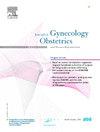Obstetrics and gynecology residents’ preparedness to perform essential obstetric procedures autonomously: A national survey among French residents and teachers
IF 1.6
4区 医学
Q3 OBSTETRICS & GYNECOLOGY
Journal of gynecology obstetrics and human reproduction
Pub Date : 2025-09-17
DOI:10.1016/j.jogoh.2025.103038
引用次数: 0
Abstract
Objective
To assess the self-evaluation of French residents and the opinion of academic teachers regarding the autonomy granted during residents’ training and the level of preparation achieved at the end of the residency to perform essential obstetric procedures.
Methods
A national survey of French obstetrics and gynecology residents and their academic teachers was conducted using an online questionnaire distributed in 2023, which gathered the self-evaluation by residents and opinion of academic teachers on the level of autonomy for essential obstetric procedures and perceptions of preparedness upon graduation. The survey also examined perceptions on the impact of factors that improve autonomy.
Results
510 of the 1197 (43%) residents and 49 of the 137 academic teachers (36%) completed the questionnaire. Both residents and academic teachers were confident that residents would be prepared at the end of residency to perform most essential obstetric procedures, including vacuum and forceps or spatula assisted vaginal delivery. However, regarding advanced obstetric surgery in case of severe postpartum hemorrhage (PPH), only 36% of 6th-year residents reported feeling capable of performing a uterine artery ligation in case of an emergency, and 11% in performing a hemostatic hysterectomy. Main factors that were perceived as important for improving autonomy were the number of cases and the quality of coaching.
Conclusion
French residents reported a gradual increase in autonomy throughout their residency for the majority of essential obstetric procedures, with the exception of surgical management of severe PPH. Teachers shared a similar opinion. Simulation and the quality of supervision appear to be promising pathways for enhancing their autonomy.
妇产科住院医师自主执行基本产科手术的准备:一项对法国居民和教师的全国性调查。
目的:评估法国居民的自我评价和学术教师对住院医师培训期间授予的自主权的意见,以及在住院医师结束时完成必要产科手术的准备水平。方法:采用在线调查问卷,于2023年对法国妇产科住院医师及其学术教师进行调查,收集住院医师的自我评价和学术教师对产科基本手术自主程度的看法以及毕业准备的看法。该调查还调查了人们对提高自主性因素影响的看法。结果:1197名居民中有510人(43%)完成了问卷调查,137名学术教师中有49人(36%)完成了问卷调查。住院医生和学术老师都相信,住院医生在实习期结束时将准备好执行最基本的产科手术,包括真空和镊子或刮刀辅助阴道分娩。然而,在严重产后出血(PPH)情况下的高级产科手术中,只有36%的六年级住院医生报告说他们有能力在紧急情况下进行子宫动脉结扎,11%的人有能力进行止血子宫切除术。被认为对提高自主性很重要的主要因素是案例的数量和辅导的质量。结论:法国居民报告说,除了严重PPH的手术治疗外,他们在住院期间对大多数基本产科手术的自主权逐渐增加。教师们也有类似的看法。模拟和监督质量似乎是提高他们自主性的有希望的途径。
本文章由计算机程序翻译,如有差异,请以英文原文为准。
求助全文
约1分钟内获得全文
求助全文
来源期刊

Journal of gynecology obstetrics and human reproduction
Medicine-Obstetrics and Gynecology
CiteScore
3.70
自引率
5.30%
发文量
210
审稿时长
31 days
期刊介绍:
Formerly known as Journal de Gynécologie Obstétrique et Biologie de la Reproduction, Journal of Gynecology Obstetrics and Human Reproduction is the official Academic publication of the French College of Obstetricians and Gynecologists (Collège National des Gynécologues et Obstétriciens Français / CNGOF).
J Gynecol Obstet Hum Reprod publishes monthly, in English, research papers and techniques in the fields of Gynecology, Obstetrics, Neonatology and Human Reproduction: (guest) editorials, original articles, reviews, updates, technical notes, case reports, letters to the editor and guidelines.
Original works include clinical or laboratory investigations and clinical or equipment reports. Reviews include narrative reviews, systematic reviews and meta-analyses.
 求助内容:
求助内容: 应助结果提醒方式:
应助结果提醒方式:


